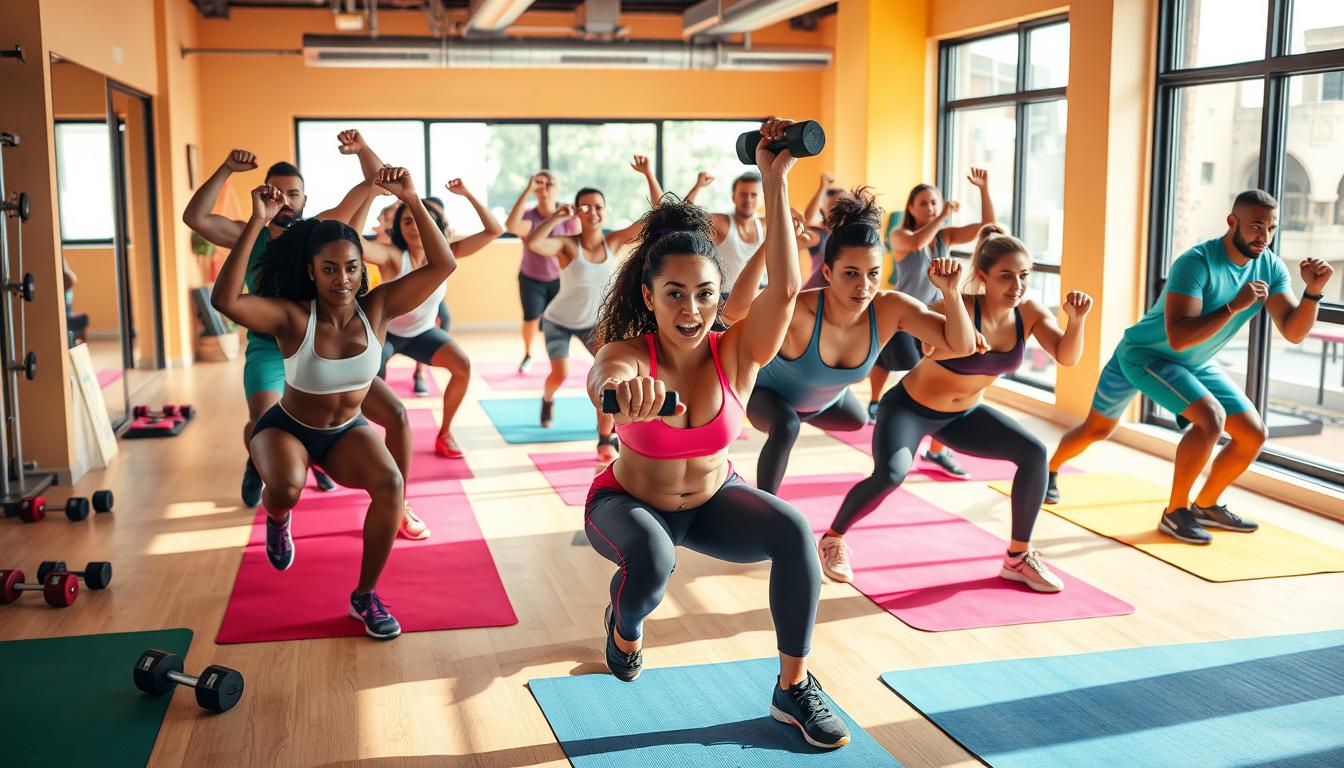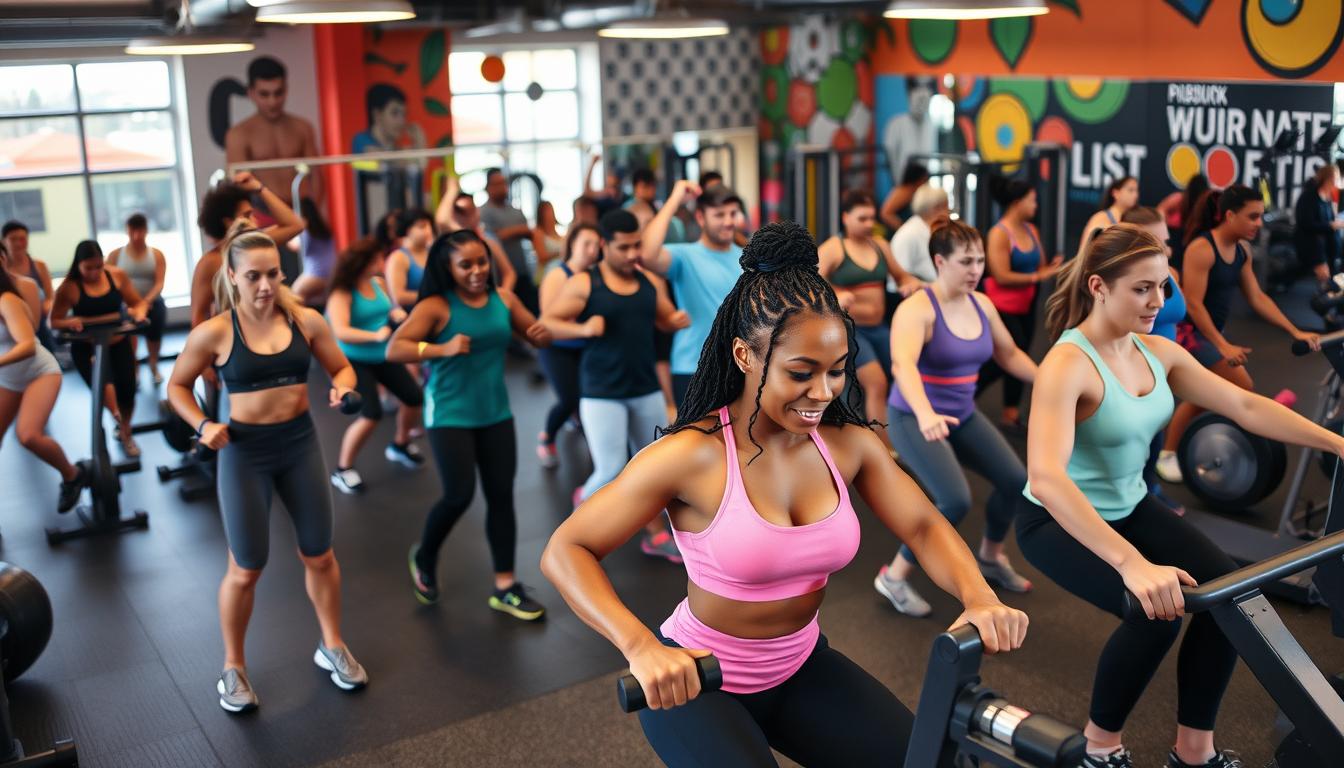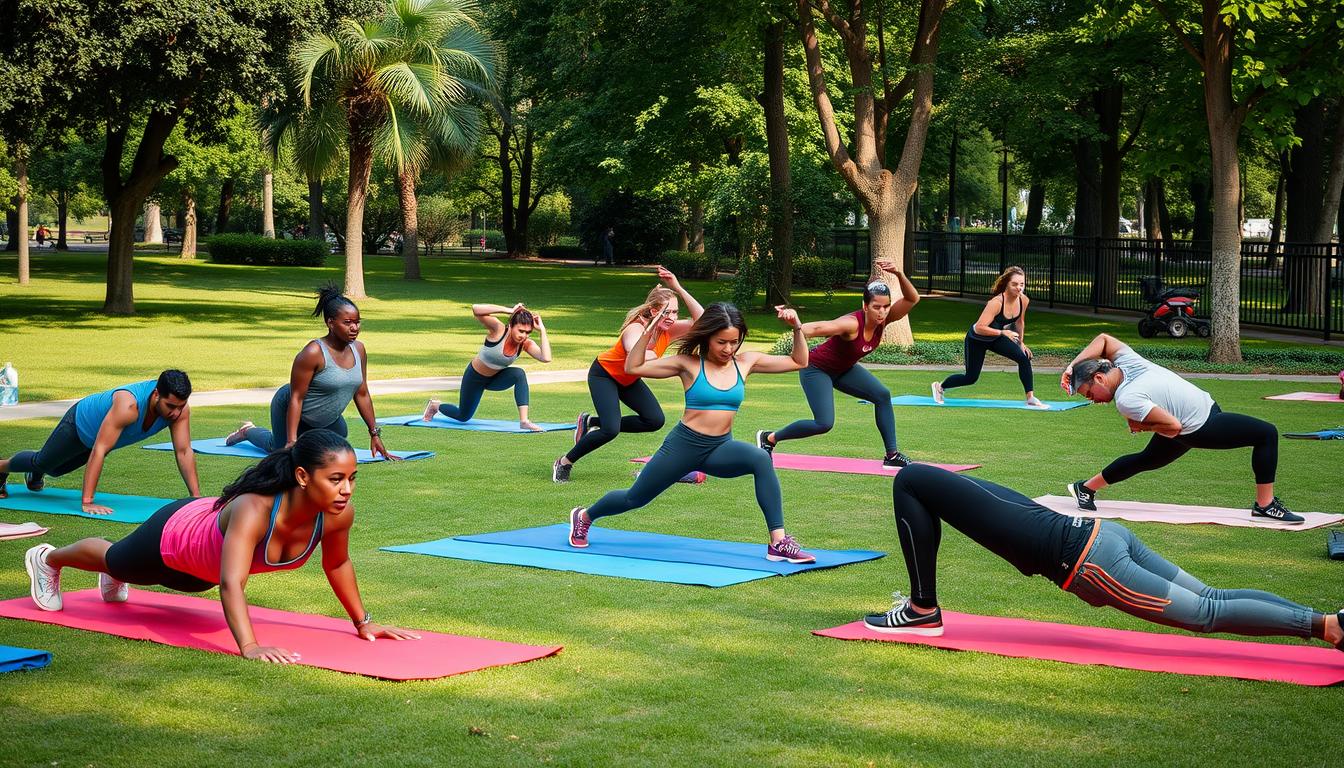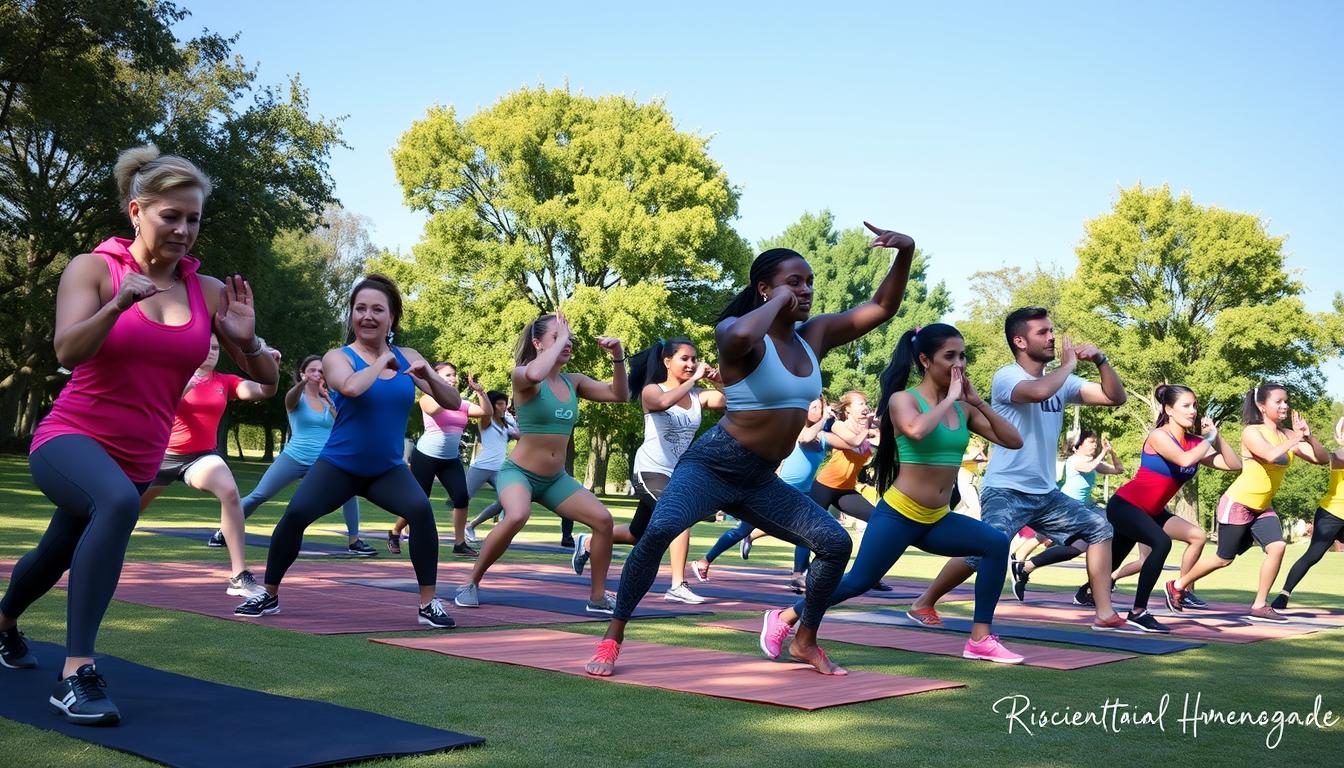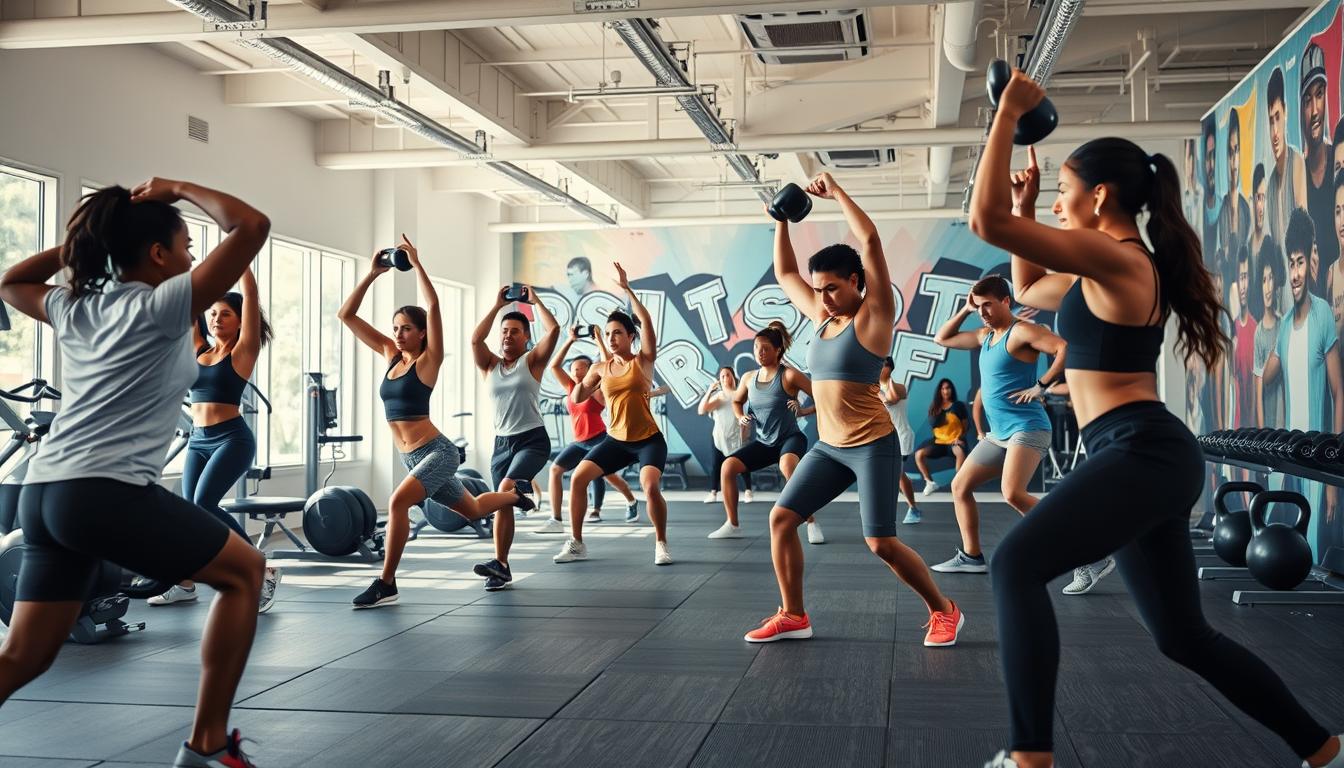Unlocking the power of full-body workouts is key to transforming your body and reaching fitness goals. These workouts are efficient and effective, saving you time while helping you build a lean, strong body. They work on many muscle groups at once, making your workouts more impactful and speeding up your progress.
Full-body training makes your workouts more streamlined and taps into the metabolic benefits of these exercises. It boosts your caloric burn, muscle-building, and helps you achieve a balanced physique. This approach to fitness helps you achieve better results faster than traditional methods.
Key Takeaways
- Full-body workouts offer time-efficient and effective solutions for achieving fitness goals.
- Targeting multiple muscle groups simultaneously maximizes workout impact and accelerates progress.
- The metabolic advantages of full-body training, such as increased caloric burn and muscle-building potential, support rapid transformation.
- A holistic, full-body approach to fitness leads to a more balanced, well-rounded physique.
- Incorporating full-body workouts into your routine can help you reach new levels of performance and transformation.
Understanding the Power of Full-Body Training for Quick Results
Reaching your fitness goals doesn’t have to take forever. Full-body workouts are a quick and effective way to build strength and shape your body. They also boost your metabolism. By understanding how these workouts work, you can reach your full potential.
Science Behind Full-Body Workouts
Full-body training routines work by using many muscles at once. This leads to a more complete and efficient workout. It also triggers important hormones like growth hormones and testosterone, helping you build muscle.
These workouts also make you burn more calories, even after you’re done exercising. This is because they activate more muscles than usual.
Benefits of Compound Exercises
Compound exercises like squats, deadlifts, and pull-ups are key in full-body training. They work many muscles at once, helping you get stronger and more functional. By focusing on these exercises, you can get a better workout in less time.
Metabolic Advantages
Full-body workouts are great for boosting your metabolism. They use compound exercises and work many muscles at once. This leads to burning more calories during and after your workout.
This metabolic boost helps you burn more calories all day. It supports your weight loss or body composition goals.
“Incorporating full-body training into your routine can be a game-changer in achieving your fitness goals. The synergistic effects of compound exercises and the metabolic advantages make this approach a highly efficient and effective way to transform your body.”
Essential Equipment for Effective Full-Body Training
Reaching your fitness goals is easier with the right workout gear. Whether you’re setting up a home gym or looking for versatile tools, the right equipment makes a big difference. Let’s look at the key workout equipment, home gym essentials, and training tools for your fitness journey.
Resistance bands are a versatile and affordable choice. They come in different resistance levels, helping you work out various muscle groups. They’re great for full-body exercises, strengthening your upper body, core, and lower body.
Dumbbells are also crucial for full-body training. They allow for exercises that target single muscles and engage many at once. You can choose from fixed or adjustable dumbbells, fitting your strength level and goals.
Kettlebells offer a dynamic workout option. Exercises like swings and Turkish get-ups boost your endurance and power. Adding kettlebells to your routine can burn calories, build muscle, and improve your fitness.
Bodyweight exercises are also essential for full-body workouts. Tools like pull-up bars, resistance bands, and suspension trainers can challenge your body without bulky equipment.
| Workout Equipment | Home Gym Essentials | Training Tools |
|---|---|---|
| Resistance Bands | Dumbbells | Kettlebells |
| Adjustable Dumbbells | Pull-up Bar | Suspension Trainer |
| Stability Ball | Resistance Bands | Medicine Ball |
For effective full-body training, you need a variety of workout equipment, home gym essentials, and training tools. The right tools help you achieve your fitness goals through dynamic workouts.
Structuring Your Workout Plan for Maximum Efficiency
Creating a good full-body workout plan is essential for reaching your fitness goals. Knowing the best training frequency, recovery times, and progressive overload can help you get the most out of your workouts. This way, you can see faster progress.
Optimal Training Frequency
Most people find that working out their full body 2-3 times a week is best. This gives your muscles enough time to heal and grow. But, don’t overdo it. Too much can cause burnout, injuries, and less results.
Rest and Recovery Guidelines
Rest is as important as working out. Make sure to rest for at least 48 hours between full-body workouts. This lets your muscles fix and get stronger. Light cardio or mobility exercises during this time can help too.
Don’t forget about sleep and managing stress. They help your body recover and adapt better.
Progressive Overload Principles
- Gradually increase the weight, reps, or volume of your exercises over time.
- Introduce new movements or variations to challenge your body in different ways.
- Adjust your rest periods to keep your muscles working harder.
- Explore periodization strategies to strategically cycle your training load.
Using these progressive overload principles will keep pushing your body. This leads to better strength, muscle, and fitness over time.
“Consistency and patience are key when it comes to implementing a successful full-body workout plan. Trust the process and celebrate your incremental progress along the way.”
Focus on the right training frequency, recovery, and progressive overload. This will help you create a workout plan that works well and gives you great results.
Warm-Up Routines to Prevent Injury and Enhance Performance
Starting your fitness journey with full-body workouts? It’s key to focus on the right warm-up. A good warm-up prevents injury and boosts your pre-workout routine performance.
For a great warm-up, target big muscle groups and joints. Here are some dynamic exercises to add to your routine:
- Bodyweight Squats: Do 10-15 reps to get your lower body ready and joints prepared.
- Arm Circles: Move your arms in circles to loosen your shoulders and upper back.
- High Knees: Lift your knees up to hip height, switching legs fast to raise your heart rate.
- Leg Swings: Swing your legs forward and backward to keep control and stretch.
- Inchworms: Start standing, walk your hands out to a plank, then back to standing to stretch your hamstrings and engage your core.
Adjust your warm-up’s length and intensity based on your fitness level and workout needs. Spend time getting your body ready. This will lead to better performance and less chance of injury prevention.
Adding these dynamic warm-up exercises to your routine prepares you for a safe and effective full-body workout. It helps you reach your fitness goals quicker.
High-Intensity Full-Body Circuit Training
Take your fitness to the next level with high-intensity full-body circuit training. This method combines HIIT workouts with compound movements for quick results. It burns fat fast and builds muscle.
Circuit Design Fundamentals
A good full-body circuit starts with a solid design. Choose exercises that work many muscles at once. This way, you get the most out of each rep, making your workout more efficient.
Time-Based vs. Rep-Based Approaches
There are two ways to do circuit training. Time-based means doing as many reps as you can in a set time. Rep-based is about doing a certain number of reps for each exercise. Try both to see what works best for you.
Rest Period Optimization
Managing rest periods is key in circuit training. Use short breaks, 30 seconds to 1 minute, to keep the intensity high. This boosts fat burning and muscle growth.
High-intensity full-body circuit training opens up a world of efficient exercises. It’s a challenge, but it can transform your fitness. Push yourself and see the amazing results.
Bodyweight Exercises for Total Body Transformation
Getting a full-body transformation doesn’t need fancy gym gear. Your body can be the key to amazing fitness. Explore no-equipment workouts, calisthenics, and functional fitness to reach your physical best.
Bodyweight exercises are key for a balanced workout. They work many muscles at once, improving your core, upper, and lower body. Learning these exercises boosts strength, muscle, and athletic skills.
Essential Bodyweight Exercises for a Full-Body Transformation
- Push-ups: A classic that strengthens your chest, shoulders, and triceps.
- Squats: Work your lower body, including glutes, quadriceps, and calves.
- Pull-ups: Build upper body strength, focusing on back, biceps, and grip.
- Lunges: Improve legs, glutes, and core for better balance and stability.
- Planks: Strengthen your core, enhancing body control and posture.
By mixing these no-equipment workouts into a routine, you can change your body and reach fitness goals. You don’t need any special gym equipment.
| Exercise | Primary Muscle Groups Targeted | Beginner Progression | Advanced Variation |
|---|---|---|---|
| Push-ups | Chest, Shoulders, Triceps | Wall Push-ups | Decline Push-ups |
| Squats | Quadriceps, Glutes, Hamstrings | Air Squats | Pistol Squats |
| Pull-ups | Back, Biceps, Forearms | Assisted Pull-ups | Weighted Pull-ups |
“The beauty of bodyweight exercises lies in their simplicity and versatility. By mastering these movements, you unlock the key to a full-body transformation, all while building functional strength and improving your overall fitness.”
Use the power of calisthenics and functional fitness to elevate your training. Add these bodyweight exercises to your routine. See the amazing changes in your physique, strength, and health.
Achieve Your Fitness Goals Fast with These Full-Body Workouts
Ready to boost your fitness? Our full-body workout routines are here to help. They’re designed for all fitness levels. Whether you’re starting out or looking to challenge yourself, we’ve got you covered.
Beginner-Friendly Routines
Starting your fitness journey? Our beginner routines are perfect for you. They focus on proper form and gradual progress. This lets you build strength and endurance at your own pace.
Start with the basics and watch your confidence grow. With each session, you’ll become more capable.
Intermediate Progressions
Ready for more? Our intermediate routines are here. They include tougher movements and combinations. This helps you break through plateaus and see amazing progress.
Get ready to challenge yourself. You’ll see impressive fitness adaptations with consistent training.
Advanced Variations
Looking for a bigger challenge? Our advanced routines are for you. They feature complex movements and increased intensity. This maximizes the effectiveness of your workouts.
Ready to reach new heights? These routines will help you continually push your limits.
No matter your fitness level, we have routines for you. Start your journey to achieving your fitness goals today!
Nutrition Strategies to Support Your Training
Proper nutrition is key to reaching your fitness goals. It helps fuel your body before, during, and after workouts. This boosts your performance, muscle recovery, and progress.
Here are some important workout nutrition tips to help you succeed:
- Pre-workout Fueling: Eat a balanced meal or snack with carbs, proteins, and fats. This gives you energy and helps with muscle recovery. Try oatmeal with Greek yogurt and berries, or whole-grain toast with peanut butter and banana.
- Hydration Importance: Drinking enough water is vital for performance fueling and muscle function. Stay hydrated all day and drink water before, during, and after workouts.
- Post-workout Nutrition: Eat carbs and proteins within 30 minutes of finishing your workout. This helps start the muscle recovery process. Good options include a protein shake with fruit or a turkey and cheese sandwich on whole-grain bread.
A balanced diet is crucial for your full-body training success. Try different foods and timing to find the best workout nutrition plan for you.
| Nutrient | Benefits for Full-Body Training |
|---|---|
| Carbohydrates | Provide energy for high-intensity workouts and replenish glycogen stores for muscle recovery. |
| Protein | Essential for building and repairing muscle tissue, supporting workout nutrition and performance fueling. |
| Healthy Fats | Promote hormone regulation, joint health, and sustained energy release for muscle recovery. |
“Proper nutrition is the foundation for achieving your fitness goals. Fuel your body with the right nutrients to support your full-body training and unlock your true potential.”
Recovery Techniques for Sustainable Progress
Reaching your fitness goals is more than just intense workouts. It’s also about how well you recover. To keep your body strong and avoid burnout, focus on sleep, active recovery, and mobility exercises.
Sleep Optimization
Getting quality sleep is key for your body to recover and adapt. Aim for 7-9 hours each night. Make your bedroom cool, dark, and tech-free. A regular sleep schedule helps your body rest better.
Active Recovery Methods
Active recovery helps your body recover too. Try low-intensity activities like walking, gentle yoga, or light cycling. These can ease muscle soreness and get you ready for your next workout.
Mobility Work
Good mobility and flexibility prevent injuries and boost performance. Spend time each day on mobility exercises like dynamic stretches and foam rolling. This improves your range of motion and reduces injury risks.
FAQ
What are the benefits of full-body workouts?
Full-body workouts boost muscle activation and hormonal responses. They also improve metabolism. You can work out multiple muscle groups at once, saving time and being efficient.
What type of equipment is essential for effective full-body training?
You’ll need resistance bands, dumbbells, kettlebells, and bodyweight tools. These versatile items help you do compound exercises. They’re key for a total-body transformation.
How often should I train using a full-body workout routine?
Aim for 2 to 4 full-body workouts a week. This depends on your fitness level and how well you recover. Make sure to rest enough to grow muscle and avoid overtraining.
How can I prevent injuries and enhance my performance during full-body workouts?
Start with a dynamic warm-up to prevent injuries and boost performance. This activates muscles, improves mobility, and gets your body ready for the workout.
What are the key principles of high-intensity circuit training for full-body workouts?
High-intensity circuit training focuses on circuit design and rest periods. It’s a fast way to burn fat and build muscle. Choose time-based or rep-based approaches to fit your goals.
How can I adapt my full-body workout routine to different fitness levels?
Start with beginner-friendly routines and progress to more challenging ones. This ensures your workout matches your fitness level. It helps you grow gradually and sustainably.
What nutritional strategies should I consider to support my full-body training?
Good nutrition is key for full-body training. Focus on pre- and post-workout meals, stay hydrated, and eat nutrient-rich foods. This helps with muscle recovery and boosts performance.
How can I promote sustainable progress and prevent burnout with my full-body workouts?
Use recovery techniques like better sleep, active recovery, and mobility exercises. These methods help you keep making progress and avoid burnout from your workouts.
